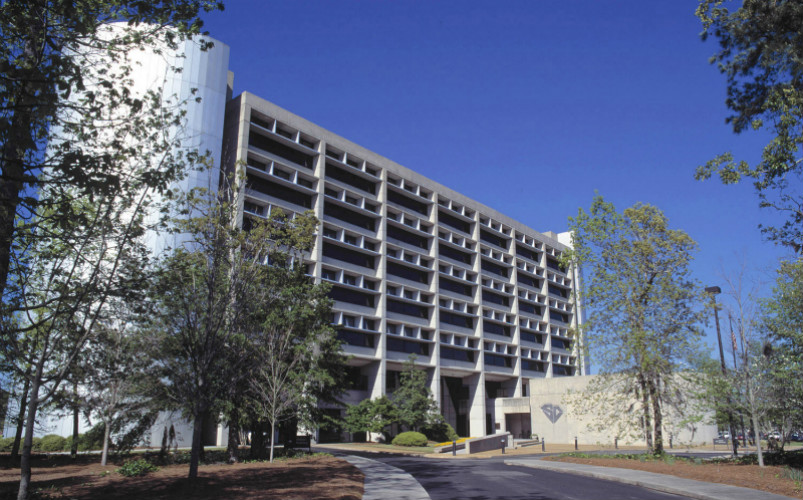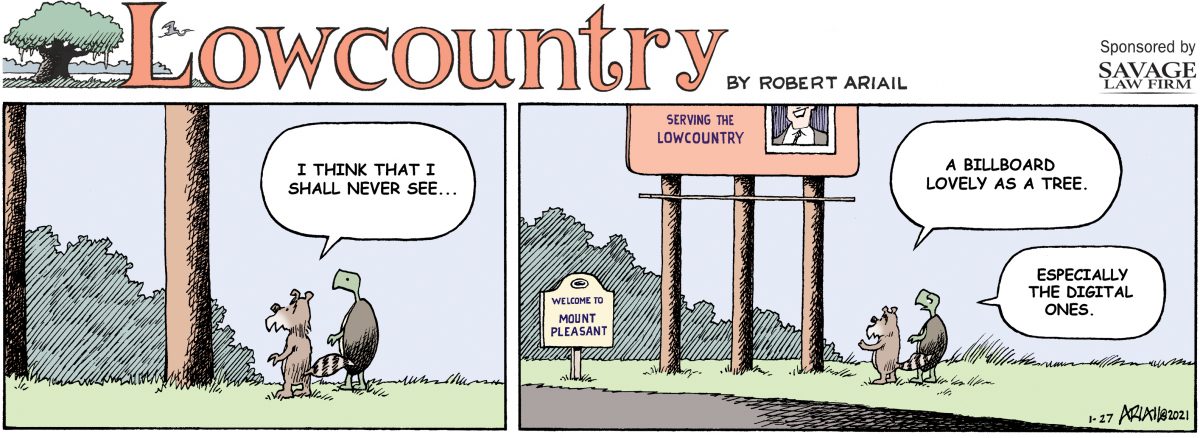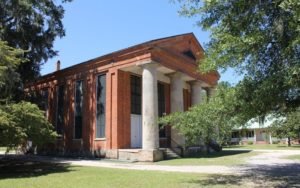STATEHOUSE REPORT | ISSUE 20.05 | JAN. 29, 2021
BIG STORY: Senate subcommittee pushes on NextEra request
LOWCOUNTRY, Ariail: Pesky billboards
COMMENTARY, Brack: Boyhood hero Aaron continues to inspire
SPOTLIGHT: Palmetto Care Collections
MY TURN, Spivak: Recall election proposal could bolster reform
FEEDBACK: Thanks for sensible thoughts
MYSTERY PHOTO: Close-up mystery
Senate subcommittee pushes on NextEra request

By Andy Brack, editor and publisher | A state Senate subcommittee unanimously passed a resolution Thursday that could force a Florida utility to turn over correspondence, documents and information on consulting fees related to an attempt to purchase the government-backed state electricity provider Santee Cooper.
 “We’ve got a multibillion-dollar asset here,” S.C. Sen. Dick Harpootlian, D-Richland, said today. “Are we being hoo-dooed into a fire sale by a huge utility? Are we selling it on the cheap? Should we sell it when no one has done a side-by-side projection about rates?”
“We’ve got a multibillion-dollar asset here,” S.C. Sen. Dick Harpootlian, D-Richland, said today. “Are we being hoo-dooed into a fire sale by a huge utility? Are we selling it on the cheap? Should we sell it when no one has done a side-by-side projection about rates?”
Santee Cooper came under scrutiny in 2017 after the implosion of a $9 billion effort to build a nuclear power facility in Fairfield County. Santee Cooper’s share of the busted project, being built with then-existing S.C. Electric & Gas, was about $4 billion. Since then, legislators have struggled with whether to sell Santee Cooper, get a company to manage it or allow it to reform itself.
Senate Judiciary Committee Chair Luke Rankin, the Horry County Republican who authored the resolution that seeks extensive disclosure of information from Florida’s NextEra Energy, today said the Senate was making a good-faith effort to get facts and conduct due diligence on the future of Santee Cooper.
“What we don’t know is what’s going on behind the scenes and the numbers they [NextEra] produced to the Department of Administration are not the full story,” he said in a telephone interview. “We’re trying to get the full story.”

On Thursday, the subcommittee voted to send the Senate resolution (S. 475) by Rankin to the Senate Judiciary Committee to consider, possibly during the week of Feb. 8. The subcommittee, however, will meet 3 p.m. Tuesday to consider a Santee Cooper reform proposal by Rankin. Other members of the subcommittee include state GOP Sens. Chip Campsen of Charleston, Scott Talley of Spartanburg and Brian Adams of Goose Creek, and Democratic Sens. Brad Hutto of Orangeburg and Margie Bright Matthews of Walterboro.
Like Harpootlian, Rankin said it was important for legislators to know what was in the state’s best interest before deciding Santee Cooper’s future.
“For those in my area who are direct service customers, the prospect of paying more in a monthly electric bill just because somebody wanted to sell it for a subjective political reason — that ain’t going to square,” Rankin said.
Responding to a Jan. 15 letter
 At issue Thursday was a Jan. 15 response by NextEra Energy to a Dec. 31 subcommittee request for information about the company’s interest and activities related to the future of Santee Cooper. The company is interested in purchasing the utility, as chairman and CEO Jim Robo wrote: “NextEra has been pleased to participate in the several processes South Carolina has undertaken related to the potential sale of Santee Cooper’s assets. We would welcome the opportunity to become the service provider to nearly 2 million South Carolinians…”
At issue Thursday was a Jan. 15 response by NextEra Energy to a Dec. 31 subcommittee request for information about the company’s interest and activities related to the future of Santee Cooper. The company is interested in purchasing the utility, as chairman and CEO Jim Robo wrote: “NextEra has been pleased to participate in the several processes South Carolina has undertaken related to the potential sale of Santee Cooper’s assets. We would welcome the opportunity to become the service provider to nearly 2 million South Carolinians…”
He went on to say the company had provided “a very significant quantity and material to our business, to the goals and objectives in our bid, and to how we would serve the residents and businesses currently served by Santee Cooper.” But he said the company “will not be providing additional documentation at this time.”
That was a slap in the face to some in the state Senate, which led to Rankin’s resolution being introduced on Jan. 21.

“The members of the subcommittee — me and a few others — are not committed to not sell or to sell Santee Cooper,” Harpootlian said. “We want to know what our options are.”
If Rankin’s resolution passes the Senate and House as written, it would require NextEra to provide mounds of information since July 31, 2017 — all Santee Cooper-related correspondence to legislators, staff and the governor as well as lists of and payments to law firms, consultants, lobbyists, public relations individuals hired directly or indirectly to help the company’s effort. The resolution also seeks lists of S.C. political and charitable contributions, and payments to chambers of commerce, political blogs and social media entities.
Harpootlian said he was ready to filibuster efforts on Santee Cooper if NextEra Energy didn’t give answers to the Senate’s questions.
Rankin said the committee also was exploring use of subpoena power to get the information it wants from NextEra.
“If this is an objectively-driven decision, then why would there be any opposition to producing the requested items we’ve set forth?” Rankin asked. “If it is not objectively-driven, but more politically-driven, then let’s be honest about that, too. The bottom line question is, what is in the state’s interest?”
- Have a comment? Send to: feedback@statehousereport.com.
Pesky billboards

Here’s a new cartoon by Robert Ariail that riffs on a ban of digital billboards by the Town of Mount Pleasant, which now is battling a lawsuit from a billboard company. It first was published in our sister newspaper, the Charleston City Paper. Love it? Hate it? What do you think: feedback@statehousereport.com.
Boyhood hero Aaron continues to inspire

By Andy Brack, editor and publisher | In the sweltering south Georgia heat and humidity of July 1971, there was one thing I absolutely knew: Hank Aaron of the Atlanta Braves was going to be at my 10th birthday party.
 My hero Hank, my friends and I would play catch and swing on a backyard jungle gym. We’d gorge ourselves on hamburgers, cake and ice cream. We’d laugh and horse around. It was going to be great.
My hero Hank, my friends and I would play catch and swing on a backyard jungle gym. We’d gorge ourselves on hamburgers, cake and ice cream. We’d laugh and horse around. It was going to be great.
Never mind that the 37-year-old home run king was 2,500 miles away in California between games with Los Angeles (Braves beat the Dodgers 3-1) and San Francisco (Braves beat the Giants 4-1). There was a one-day layover in between. I convinced myself he would make it. He didn’t, of course, but his star never tarnished as we both grew older.
And now, the slugger with the smooth, powerful swing has passed away. So too has part of my childhood and that of former kids all over America.
Aaron mesmerized young fans. He was the full package — he could do everything on the field, playing with a consistent and calm grace that masked the real struggles of race he dealt with daily. Back in 1971 as our country schools integrated, most kids didn’t seem to have Aaron as a hero. But in tributes online and in newspapers, that clearly wasn’t the case.
“He was hero to every boy born before 1965,” said Russell Guerard of Charleston.

There was just something about him, former GOP state Rep. Hunter Limbaugh of Columbia wrote.
“It’s not that those players [Mays, Clemente, Frank Robinson] lacked ‘something,’ but more that Aaron’s dignity was his essence. I’d like to think that even as a youngster, that’s what drew me to him.”
Robert Kittle, a former Columbia television newsman who now is communications director for the S.C. Attorney General’s office, remembers flocking to Atlanta-Fulton County Stadium to watch Aaron.
“I remember how exciting it was when he was chasing Babe Ruth’s record, that my hometown hero was about to make history,” Kittle recalled this week. “It wasn’t until years later that I learned about the harassment he had to deal with, including death threats, and that made his accomplishment even more amazing and made me respect him even more than I already did.”
Hampton native Marilyn Jones Armstrong, who now lives in North Carolina, explained Aaron was why she loves baseball to this day.
“Daddy and I would watch the Braves (in pre-TBS days) when he made me memorize batting averages and always cheer for Hammerin’ Hank. I remember the 715th [home run that broke Babe Ruth’s record]. I remember ‘watching’ the Atlanta Braves on the radio with my grandmother at the river because we couldn’t get the game on TV.”
My father and I made an annual pilgrimage from south Georgia to Atlanta to watch Aaron and the Braves. A couple of times, we flew in a small plane — quite a thrill for a kid. One time, we climbed aboard the Nancy Hanks train in Macon and got to sit with the engineer.
A few years later when we lived in Atlanta, I remember stumbling and almost dropping my cornet when marching off of my high school football field. Why? Because there — clear as day leaning on the wire fence near the bench — was Henry Louis Aaron. He stood by himself, a dad waiting to see his sons play in the second half of the game.
My jaw still drops. Aaron had that effect.
“Sometimes we learn that our heroes really aren’t very heroic after all because they do something bad or we learn that they’re not very nice,” Kittle observed. “Hank was the opposite. As time went on, the more I learned about him, the more heroic he became, and his stature in the community grew because of his philanthropic work and mentoring.”
So now my boyhood hero is gone and so is a lingering part of my youth. I feel fortunate to have had him in my life, albeit at a distance.
He didn’t make the birthday party, but Lord have mercy, he made things better for so many others in so many ways.
Henry Louis Aaron, 1934-2021. Rest in peace.
Andy Brack is editor and publisher of Statehouse Report. His column also is published in the Charleston City Paper, Florence Morning News, Greenwood Index Journal, The (Seneca) Journal, Camden Chronicle Independent and Hartsville Messenger. Have a comment? Send to: feedback@statehousereport.com.
Palmetto Care Connections
 In this issue, we welcome a new underwriter, which allows us to bring Statehouse Report to you at no cost.
In this issue, we welcome a new underwriter, which allows us to bring Statehouse Report to you at no cost.
Established in 2010, Palmetto Care Connections (PCC) is a non-profit organization that brings technology, broadband and telehealth solutions to health care providers in rural and underserved areas in South Carolina. PCC hosts the Annual Telehealth Summit of South Carolina presenting state and national best practices and trends, as well as providing networking connections for health care, technology and broadband professionals.
The leader of the South Carolina broadband consortium, PCC assists health care providers in receiving broadband savings through the Federal Communication Commission’s Healthcare Connect Fund program. Since 2013, PCC has helped providers save more than $25 million in broadband costs.
PCC co-chairs the South Carolina Telehealth Alliance, along with the Medical University of South Carolina, serving as an advocate for rural providers and partnering with organizations to improve health care access and delivery for all South Carolinians.
- Learn more about Palmetto Care Connections.
Recall election proposal could bolster reform

By Josh Spivak, exclusive to Statehouse Report | South Carolina may not be known as the most electorally-adventurous state, but two South Carolina legislators are hoping to change that. State Reps. Lin Bennett, R-Charleston, and Patrick Haddon, R-Greenville, are now proposing amending the state’s constitution and adopting a recall election law (H. 3256).

They are not the first to suggest adopting a recall law in the Palmetto State. Such laws were proposed to target then- Lt. Gov. Ken Ard in 2011 before he resigned and there have been periodic calls to adopt a recall since, though none of these proposals have gone anywhere. South Carolina currently stands with a small group of only 11 states to not allow the recall for any officials.
This recall law would take an expansive route. Bennett and Haddon are looking to allow it against all state level officials. Right now, only 20 states have recall laws for state level officials, though Illinois only allows it for the governor and Rhode Island exempts the legislature. Another 19 states allow the recall for local officials only.
They also are proposing what is called a political recall law – one that would allow recalls for virtually any reason. Eleven of the 20 states have this law, and these are the ones that come to mind whenever anyone thinks of a recall election – California, Wisconsin, Oregon, Michigan, Arizona, Colorado, North Dakota, New Jersey, Idaho, Rhode Island and Nevada. The other states – Alaska, Georgia, Illinois, Kansas, Minnesota, Montana and Washington — have a limit that requires the recall effort only take place for a specific set of statutory reasons, frequently due to a specified crime or malfeasance in office or incompetence. Virginia also has a similar law allowing for a “recall trial,” where a judge rules on whether the official should be removed for violating the law. These “malfeasance standard” states are much less likely to have recalls. Of the 45 of 46 state-level recalls that have taken place against state legislators, governors and others, all but one have taken place in a political recall state.
It would be quite the achievement if Bennett and Haddon could get a recall law enacted. There have been no recall laws adopted for an entire state since Minnesota went this route in 1996. The law was overwhelmingly popular – it passed with over 88 percent of the vote. This was a malfeasance standard recall law, and Minnesota has had only one recall election since then. New Jersey adopted a political recall a few years before, in 1993. The Garden State’s voters were also strongly in favor of the recall law – nearly 74 percent voted for it.
The proposed South Carolina recall law would be more restrictive than many states. Petitioners would be required to gather signatures from 20 percent of registered voters to get a recall on the ballot for a statewide office on the ballot, and 25 percent of registered voters to get one against all other officials. They would have 90 days to gather the signatures. Elected officials would have a 90 day grace period at the start of the term and, if the official survives a recall vote, they could not face another recall for two years.
Among the other states with a recall law, nine of them require petitioners to collect signatures amounting to 25 percent of turnout in the previous election for the position. The requirement to collect signatures based on voter turnout means that petitioners need to gather significantly fewer signatures, as many voters do not bother turning out. Only one other state uses the 25 percent of registered voters’ requirement (New Jersey) for statewide officials.
This is not a criticism of the 25 percent of registered voters’ requirement. It simply means that the state may have less recalls than other states.
If the recall law comes to pass, South Carolina may not see a flood of recalls, but we certainly can expect them to come into play. While most recalls never get to the ballot and supporters abandon them in the signature gathering stage, when they do get to the ballot, they work. Approximately 60 percent of recalls result in the official being ousted in the election. Additionally, about 6 percent of officials resign.
The proposed South Carolina recall law is unlikely to radically reshape the state’s political world. But it will hand voters a tool to oust elected officials. In this, they will be joining other states that, for good or ill, have found the recall to be a worthwhile political reform.
Joshua Spivak is a senior fellow at the Hugh L. Carey Institute for Government Reform at Wagner College in New York. He blogs at the Recall Elections Blog and lives in Oakland, Calif. Have a comment? Send to: feedback@statehousereport.com.
Thanks for sensible thoughts
To the editor:
![]() I appreciate the straight forward, sensible thoughts expressed in the last two columns published in the Greenwood Index-Journal. Reasonable, honest statements require courage these days….
I appreciate the straight forward, sensible thoughts expressed in the last two columns published in the Greenwood Index-Journal. Reasonable, honest statements require courage these days….
Your reporting on the shortcomings of DHEC [S.C. Department of Health and Environmental Control] is a public service to the state. As a retired clinical geneticist, my husband had many frustrating encounters with the personnel there. Unfortunately, the people who really need to read your columns won’t and wouldn’t believe the facts anyway.
You are a real beacon of light. I never miss reading your column.
— Paula Taylor, Greenwood
Send us your thoughts
We love hearing from our readers and encourage you to share your opinions. But to be published, you’ve got to provide us with contact information so we can verify your letters. Letters to the editor are published weekly. We reserve the right to edit for length and clarity. Comments are limited to 250 words or less. Please include your name and contact information.
-
- Send your letters or comments to: feedback@statehousereport.com
Close-up mystery

This is a photo of something outside of South Carolina once visited by many in-state residents. Just look at recent headlines and you should figure out why it is this week’s Mystery Photo. Send your guess to feedback@statehousereport.com — and remember to include your name, home city and contact information.
 Last week’s mystery, “Historic building,” showed a view of the Salem (Black River) Presbyterian Church in Sumter County. Thanks to David Taylor of Darlington for the photo. (If you have a mysterious picture to stump our readers, send it along.)
Last week’s mystery, “Historic building,” showed a view of the Salem (Black River) Presbyterian Church in Sumter County. Thanks to David Taylor of Darlington for the photo. (If you have a mysterious picture to stump our readers, send it along.)
H/T to these readers who identified it: Jay Altman and Elizabeth Jones, both of Columbia; Bill Segars of Hartsville; Frank Bouknight of Summerville; Allan Peel of San Antonio, Texas; George Graf of Palmyra, Va.; Mark Partin of Sumter; and Kevin Mertens of Greenville.
Peel shared, “When it was first founded in 1759, the church was a log meeting-style house and wooden frame building that was established by Scottish-Irish settlers. The first brick building at this site was constructed in 1802, giving this church its nickname of the ‘Brick Church.’ The present church was built in 1846 and stands as one of the earliest brick churches in South Carolina. Readers who would like to learn more about the history of this church and see what it looks like on the inside should check out the detailed SC Picture Project article here.”
- Send us a mystery. If you have a photo that you believe will stump readers, send it along (but make sure to tell us what it is because it may stump us too!) Send to: feedback@statehousereport.com and mark it as a photo submission. Thanks.
ORDER NOW: Copies are in Lowcountry-area bookstores now, but if you can’t swing by, you can order a copy online today.
ABOUT STATEHOUSE REPORT
Statehouse Report, founded in 2001 as a weekly legislative forecast that informs readers about what is going to happen in South Carolina politics and policy, is provided to you at no charge every Friday.
Meet our team
- Editor and publisher: Andy Brack, 843.670.3996
- Special correspondents: Lindsay Street, Rodney Welch, Stephanie Barna
Donate today
We’re proud to offer Statehouse Report for free. For more than a dozen years, we’ve been the go-to place for insightful independent policy and political news and views in the Palmetto State. And we love it as much as you do.
But now, we can use your help. If you’ve been thinking of contributing to Statehouse Report over the years, now would be a great time to contribute as we deal with the crisis. In advance, thank you.
Buy the book
Now you can get a copy of editor and publisher Andy Brack’s We Can Do Better, South Carolina! ($14.99) as a paperback or as a Kindle book ($7.99). . The book of essays offers incisive commentaries by editor and publisher Andy Brack on the American South, the common good, vexing problems for the Palmetto State and interesting South Carolina leaders.
More
- Mailing address: Send inquiries by mail to: P.O. Box 21942, Charleston, SC 29413
- Subscriptions are free: Click to subscribe.
- We hope you’ll keep receiving the great news and information from Statehouse Report, but if you need to unsubscribe, go to the bottom of the weekly email issue and follow the instructions.
- Read our sister publications: Charleston City Paper (every Wednesday) | Charleston Currents (every Monday).
- © 2021, Statehouse Report, a publication of City Paper Publishing, LLC. All rights reserved.
















 We Can Do Better, South Carolina!
We Can Do Better, South Carolina!
Pingback: On NextEra, Hank Aaron and recalls – Respect The Law